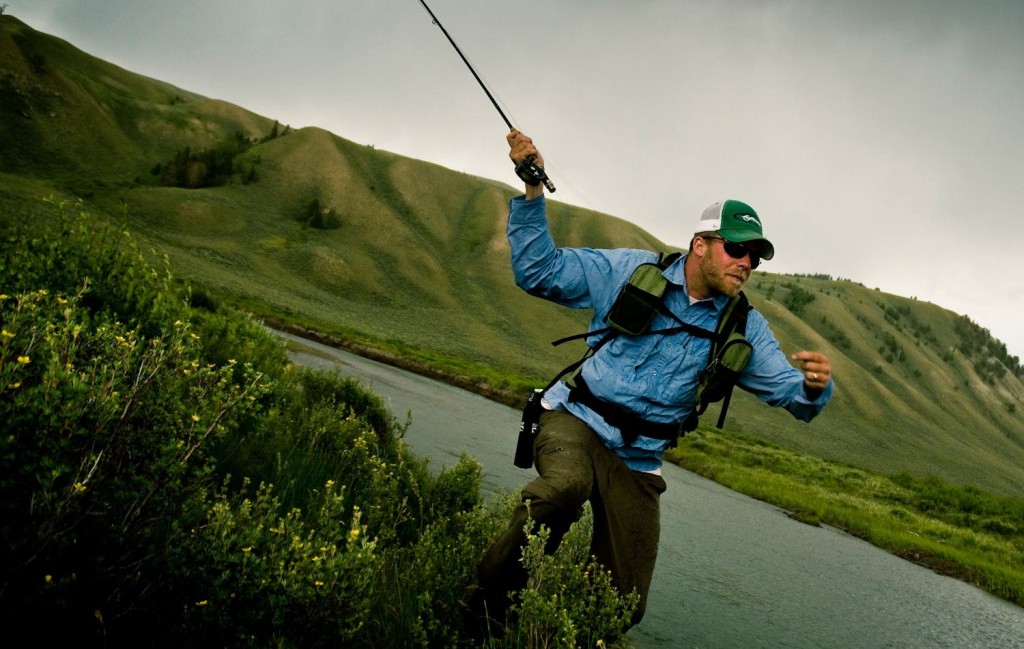Are you finding that you’re lacking distance and falling short of your target with your fly casting?
Is your power and line speed insufficient? If the answer is yes, I bet you’re also getting a fair amount of tailing loops or dreaded wind knots aren’t you? Come on, be honest. There’s absolutely nothing to be ashamed of if you’re periodically falling into this category with your fly casting. Believe me when I say, you’re not at all alone. I see it regularly on the water guiding, and most of the time anglers struggling with these problems usually are only doing one thing wrong with their fly casting. Nine times out of ten, in this scenario, anglers are decelerating their fly rod during their forward cast, back cast, or even both, in some cases. What you need to be doing to fix this problem is smoothly accelerating your fly rod during your casting stroke, making sure you’re stopping the rod at it’s fastest point. This will allow your fly rod to distribute the energy loaded during your cast efficiently, and you’ll have plenty of power (line speed) to reach your targets.
Deceleration During Your Casting Stroke: Short Story & Case Study
This past fall I was fishing big attractor dry flies with a client of mine. There were plenty of big fish willing to rise to our offerings, but to get them to eat, we had to stay far back and make long casts to them. Otherwise they’d spot us and spook. My client, a capable fly fisherman with strengths in short presentations and roll casts, developed a weakness for distance, when a head wind picked up. No matter how hard he tried, he couldn’t get the distance needed to present his dry fly ahead of the fish. Several minutes we worked a prime piece of water that I knew had some eager fish looking up, but we got no takes. My client turned to me and said, “They must not like this fly pattern”. I replied, “You may be right man”, and I handed him the nymph rig and pointed upstream to our next fishing spot. But what I really wanting to say is, “No, the fly pattern is good, you’re just not getting the fly anywhere close to your target”.
There are times when the best thing you can do guiding is to go along with your clients and not voice the complete truth. Now it’s important to understand that I had already explained to him a couple different times, that the problem he was having is that he was slowing down his fly rod to a stop during his casting stroke, and it was sucking his power and distance out of his cast. If I would have pointed out that he failed to get bites because of his inability to correct his deceleration problem during his casting stroke, it would have killed his morale and confidence. And that could have started a falling domino effect, resulting in his fishing skills going down the tubes the remainder of the day. Instead, I decided to cut our losses, and move him up river to another hole where I could position him close enough to make a good presentation, and he quickly hooked up.
The moral of the story is, know your clients limits. Sometimes you have to be willing to walk away from a prime opportunity if your angler can’t execute. Remember, some success is better than no success. Do your best to diagnose and fix casting mechanic errors, but understand you only have so much time on the water, and some battles can’t be won during a single day on the water.
Keep it Reel
Kent Klewein Gink & Gasoline www.ginkandgasoline.com hookups@ginkandgasoline.com Sign Up For Our Weekly Newsletter!
Sign Up For Our Weekly Newsletter!


Unfortunately there are many folks like this! For less money than the cost of a guided day fishing you can get a casting lesson and really up your game. As owner of 2 fly fishing schools and a former saltwater guided I see it too often. The client shows up with the greatest fly rods and the best lines and can’t get the job done. Why do so many fly casters not get lessons or practice?
Scott, thanks for your help with my casting, you are a fine teacher!
Scott,
I would say the answer to that question is most novice anglers would rather spend their money on a guided fishing trip and catch fish rather than hire a professional casting instructor and not bend their rod. The problem with that is casting ability has a huge impact on the amount of success on the water. Presentation, presentation, presentation.
I’ll be the first to admit, it’s really the guides job to always improve their client’s casting and fishing skills during the guide trip. Unfortunately, conditions on the water, available time, and learning curve per the angler of the day, don’t always make it easy for the guide to pull it all off. Some people pick it up quick while others learn much slower.
Not all guides are great casting instructors either, unfortunately, some are fishy as hell, but struggle with teaching beginners the fundamentals. You get what you pay for with true casting instructors, that’s for sure. I’ll be the first to admit that every guide should from time to time take refresher casting clinics to help them maintain the best teaching tactics, and clients should be honest with themselves when they need to set up a pre-trip casting lesson before an important fishing trip coming up. This is important for all fishing trips, but especially for saltwater fly fishing trips which generally are much tougher and demanding conditions that the angler sees once a year if their lucky.
Regards,
Kent Klewein
If I’m fishing with a guide and he/she sees a problem with my casting technique that is limiting my ability to catch fish, I would hope they would mention it and make it a “teachable” moment.